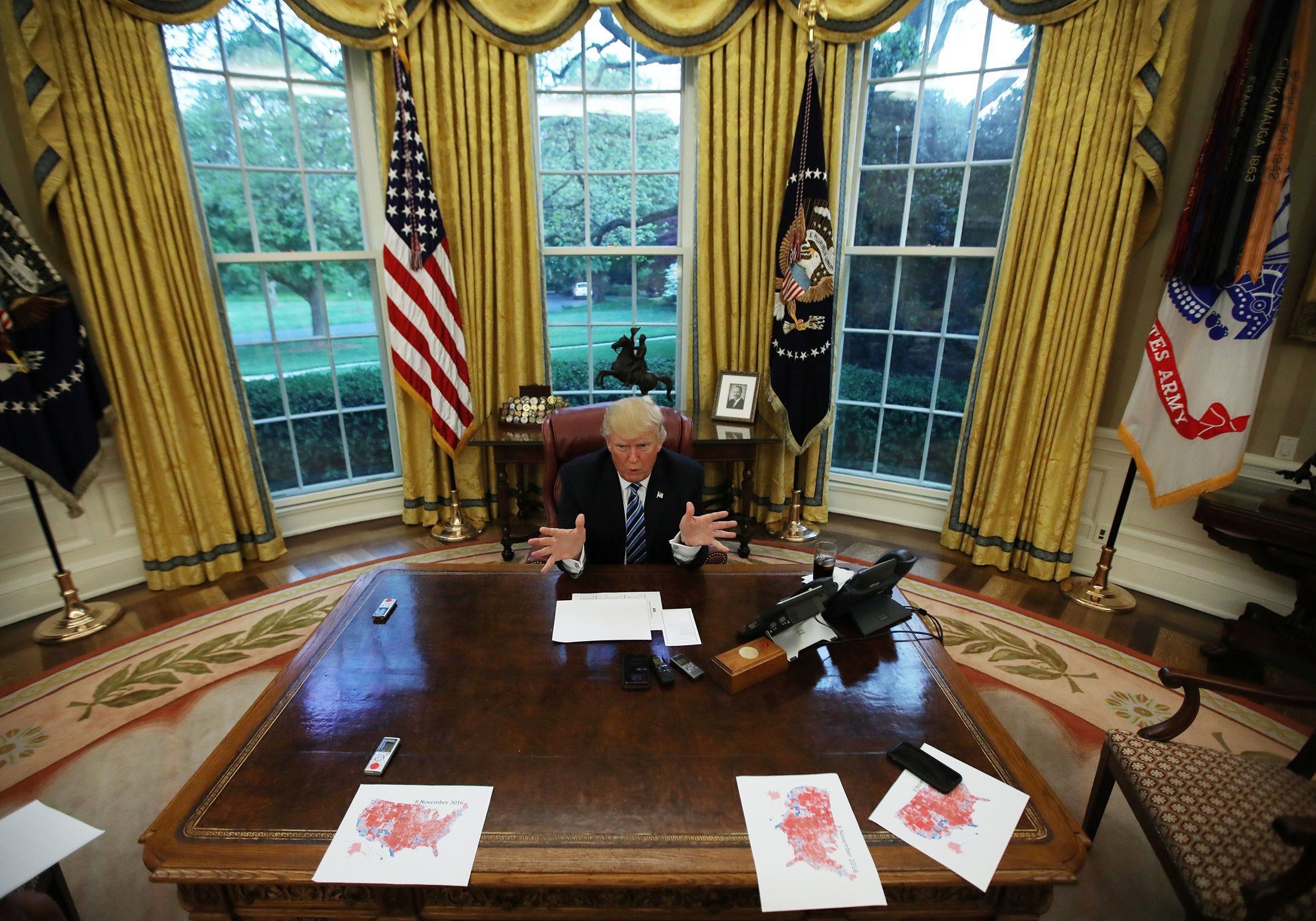Trump first year: Photos highlighting the controversies and protests of the US President's term so far
Trump's first year in office was coloured by an investigation into whether his campaign colluded with the Russian government to affect the election outcome, insults and threats of war with North Korea, and an effort to pass business-friendly legislation.

Your support helps us to tell the story
From reproductive rights to climate change to Big Tech, The Independent is on the ground when the story is developing. Whether it's investigating the financials of Elon Musk's pro-Trump PAC or producing our latest documentary, 'The A Word', which shines a light on the American women fighting for reproductive rights, we know how important it is to parse out the facts from the messaging.
At such a critical moment in US history, we need reporters on the ground. Your donation allows us to keep sending journalists to speak to both sides of the story.
The Independent is trusted by Americans across the entire political spectrum. And unlike many other quality news outlets, we choose not to lock Americans out of our reporting and analysis with paywalls. We believe quality journalism should be available to everyone, paid for by those who can afford it.
Your support makes all the difference.Less than 24 hours after Donald Trump took office, his presidency started generating controversy.
Photographs showing that the crowd at Trump’s swearing-in was smaller than at Barack Obama’s first presidential inauguration in 2009 caused the first ruckus in his administration - but not the last.
Trump's first year in office was coloured by an investigation into whether his campaign colluded with the Russian government to affect the election outcome, insults and threats of war with North Korea, and an effort to pass business-friendly legislation.
From the start, the White House took a combative approach, accusing the media of framing photographs of the inauguration in a way that appeared to understate the crowd size.
Press Secretary Sean Spicer argued that the images were not what they seemed and that crowds of historic size watched Trump take the oath of office.
Protests would become a hallmark of Trump's first year. On Jan. 21, the day after the inauguration, hundreds of thousands of women jammed the streets of Washington to demonstrate opposition to Trump.
A week after taking office, the Republican president signed an executive order to prevent citizens of seven predominately-Muslim countries from traveling to the United States. Known by critics as the “Muslim ban,” protesters quickly demonstrated at airports in opposition.
Trump would ignite protests again in August, when he was asked to respond to white nationalists marching in Charlottesville, Virginia, including one who drove his car into a crowd of counter-protesters, killing a woman. The president argued there were bad people “on both sides.”
Following his remarks, business leaders resigned from Trump's business councils and the panels were disbanded.
A defining feature of Trump's first year in office was the investigation into whether his campaign colluded with Russia during the election.
Trump ignited a political firestorm in May when he fired Federal Bureau of Investigation Director James Comey, who had been leading an investigation into possible collusion by the Trump 2016 presidential campaign with Russia to influence the election outcome.
Russia has denied meddling in the election and Trump has denied any collusion.
Soon afterward, the Justice Department named former FBI chief Robert Mueller as special counsel to lead the investigation.
Paul Manafort, who had briefly served as Trump's campaign manager, and his business associate Rick Gates were indicted by Mueller's team in October, accused of illegally lobbying on behalf of foreign governments.
A month later, Michael Flynn, who briefly served under Trump as U.S. national security adviser, pleaded guilty to lying to the FBI about his conversations last December with Russia's then-ambassador in Washington just weeks before Trump took office.
Trump has also found himself embroiled in a war of words with North Korea over its missile program, exchanging insults and threats with North Korean leader Kim Jong Un.
At home, Trump has struggled to enact sweeping changes he promised on the campaign trail.
He threatened to withdraw the United States from the North American Free Trade Agreement (NAFTA), but business lobbyists persuaded him to renegotiate it. Trump signed an executive order setting up talks on the trilateral trade deal, which has hit roadblocks with Mexico and Canada.
Trump's team also failed to repeal the Affordable Care Act, known as Obamacare despite Republican control of the White House and Congress.
It was not until December that Trump made headway on major legislative change as both chambers of Congress passed a sweeping tax overhaul.
The bill must be reconciled with a different version approved by the House of Representatives, but the Senate bill is expected to remain largely intact.
Photography by Carlos Barria and Reuters Photographers
Join our commenting forum
Join thought-provoking conversations, follow other Independent readers and see their replies
Comments